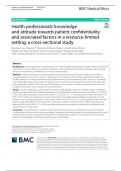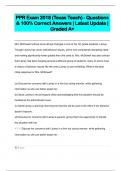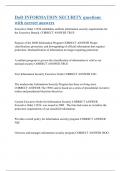Tegegne et al. BMC Medical Ethics (2022) 23:26
https://doi.org/10.1186/s12910-022-00765-0
RESEARCH Open Access
Health professionals’ knowledge
and attitude towards patient confidentiality
and associated factors in a resource‑limited
setting: a cross‑sectional study
Masresha Derese Tegegne1*, Mequannent Sharew Melaku1, Aynadis Worku Shimie2,
Degefaw Denekew Hunegnaw3, Meseret Gashaw Legese4, Tewabe Ambaye Ejigu5,
Nebyu Demeke Mengestie1, Wondewossen Zemene1, Tirualem Zeleke1 and Ashenafi Fentahun Chanie1
Abstract
Background: Respecting patients’ confidentiality is an ethical and legal responsibility for health professionals and the
cornerstone of care excellence. This study aims to assess health professionals’ knowledge, attitudes, and associated
factors towards patients’ confidentiality in a resource-limited setting.
Methods: Institutional based cross-sectional study was conducted among 423 health professionals. Stratified
sampling methods were used to select the participants, and a structured self-administer questionnaire was used
for data collection. The data was entered using Epi-data version 4.6 and analyzed using SPSS, version 25. Bi-variable
and multivariable binary logistic regression analyses were used to measure the association between the dependent
and independent variables. Odds ratio with 95% confidence intervals and P value was calculated to determine the
strength of association and to evaluate statistical significance.
Result: Out of 410 participants, about 59.8% with [95% CI (54.8–68.8%)] and 49.5% with [95% CI (44.5–54.5%)] had
good knowledge and favorable attitude towards patents confidentiality respectively. Being male (AOR = 1.63, 95% CI
[1.03–2.59]), taking training on medical ethics (AOR = 1.73, 95% CI = [1.11–2.70]), facing ethical dilemmas (AOR = 3.07,
95% CI [1.07–8.79]) were significantly associated factors for health professional knowledge towards patients’ confi-
dentiality. Likewise, taking training on medical ethics (AOR = 2.30, 95% CI [1.42–3.72]), having direct contact with the
patients (AOR = 3.06, 95% CI [1.12–8.34]), visiting more patient (AOR = 4.38, 95% CI [2.46–7.80]), and facing ethical
dilemma (AOR = 3.56, 95% CI [1.23–10.26]) were significant factors associated with attitude of health professionals
towards patient confidentiality.
Conclusion: The findings of this study revealed that health professionals have a limited attitude towards patient
confidentiality but have relatively good knowledge. Providing a continuing medical ethics training package for health
workers before joining the hospital and in between the working time could be recommended to enhance health
professionals’ knowledge and attitude towards patient confidentiality.
*Correspondence: masresha1derese@gmail.com
1
Department of Health Informatics, Institute of Public Health, College
of Medicine and Health Sciences, University of Gondar, Gondar, Ethiopia
Full list of author information is available at the end of the article
© The Author(s) 2022. Open Access This article is licensed under a Creative Commons Attribution 4.0 International License, which
permits use, sharing, adaptation, distribution and reproduction in any medium or format, as long as you give appropriate credit to the
original author(s) and the source, provide a link to the Creative Commons licence, and indicate if changes were made. The images or
other third party material in this article are included in the article’s Creative Commons licence, unless indicated otherwise in a credit line
to the material. If material is not included in the article’s Creative Commons licence and your intended use is not permitted by statutory
regulation or exceeds the permitted use, you will need to obtain permission directly from the copyright holder. To view a copy of this
licence, visit http://creativecommons.org/licenses/by/4.0/. The Creative Commons Public Domain Dedication waiver (http://creativeco
mmons.org/publicdomain/zero/1.0/) applies to the data made available in this article, unless otherwise stated in a credit line to the data.
, Tegegne et al. BMC Medical Ethics (2022) 23:26 Page 2 of 10
Keywords: Health professional, Knowledge, Attitude, Confidentiality, Ethiopia
Introduction relationship [8]. Breaches of confidentiality and shar-
Confidentiality refers to the restriction of access to per- ing data with unauthorized parties may have the poten-
sonal information from unauthorized persons and pro- tial to harm the patients’ health [13]. Health care quality
cesses at authorized times and in an authorized manner declines due to a loss of confidence in the professional-
[1, 2]. When we say patients have the right to confidenti- patient relationship [14]. Patients become hesitant to
ality, it refers to keeping privileged communication secret seek care and attend follow-up appointments due to their
and cannot be disclosed without the patient’s authoriza- mistrust of health providers [7, 8].
tion [3, 4]. Until recently, the standard curricula of Ethiopia’s
Health professionals have a legal obligation to han- recent medical schools did not include a medical ethics
dle patients’ information privately and securely [5]. As a course. Nevertheless, following proposals from the Ethio-
result, patients and professionals develop trust and a pos- pian Medical Association and curriculum review com-
itive relationship. If such highly sensitive data is improp- mittees, the medical ethics course was first established
erly disclosed, it could threaten patients’ safety [6]. Hence at Addis Ababa University’s Faculty of Medicine in 2004
confidentiality needs to be respected to protect patients’ [15]. Despite the existence of a medical ethics course,
well-being and maintain society’s trust in the physi- patients’ concern about maintaining their confidentiality
cian–patient relationship. The issue of confidentiality has has grown, and reports of unethical behavior by health
been recognized as a global concern. As a result, several professionals on patient confidentiality are familiar [15].
internationally agreed on principles and guidelines for There are so many problems regarding patient medical
maintaining the sanctity of patients’ private lives during record confidentiality and data sharing [16]. The loss of
treatment. This law, known as Data Protection Act, was patient medical records due to handling by unauthorized
enacted in 1998 and was last revised in 2018 [7, 8]. The staff without consent and transporting to another depart-
Data Protection Act was created to provide protection ment is a big issue in Ethiopia. That can affect patients’
and set guidelines for handling personal data [7]. There quality of care by consuming time, harming patient sat-
is no comprehensive data protection law in Ethiopia that isfaction, causing improper diagnosis, and making it dif-
covers health data protection [9]. Ethiopia’s only confi- ficult to get the previous history.
dentiality-oriented policy is the healthcare administra- The significance of this research is that it addresses
tion law, which requires health practitioners to maintain the rapidly growing trend of patient data sharing and
confidentiality. This law mandates health providers to confidentiality among health practitioners in developing
keep patients’ health information confidential [10]. Fur- countries taking Ethiopia as an example. There is limited
thermore, only a few research have looked into health evidence regarding health professional knowledge and
professionals’ awareness of ethical rules and data security attitude related to patients’ confidentiality in resources
and sharing laws in Ethiopia [9]. limited settings. Therefore, this study will fill evidence
Confidentiality is the basis of the legal elements of gaps on health professional knowledge, attitude, and
health records and an ethical cornerstone of excellent associated factors related to patient confidentiality in
care [11]. More importantly, the quality of information Ethiopia. This study will provide policymakers with up-
shared with healthcare experts is determined by their to-date information on health professionals’ knowledge
capacity to keep it private. Otherwise, the patient may and attitude towards patient confidentiality. Aside from
withhold important information, lowering the quality of that, the outcomes of this study may aid legislators in
care offered. developing plans to improve health professionals’ knowl-
Although information sharing is essential in an inter- edge and attitude toward patient confidentiality.
disciplinary health team, each professional should limit
information disclosure to an unauthorized health profes- Method
sional to plan and carry out procedures in the patient’s Study design and setting
best interests [12]. The exchange of patient medical An Institutional based cross-sectional study was con-
records and data with an unauthorized person continues ducted among health professionals from August–Sep-
to be a common occurrence in a variety of clinical settings tember 2021. Gondar is a historical town situated in the
[5]. Breaches of confidentiality in clinical practice due to northwestern part of Ethiopia, 772 km far from the cap-
negligence, indiscretion, or sometimes even maliciously ital Addis Ababa and 168 km from Bahir Dar [17]. The
jeopardize a duty inherent in the physician–patient University of Gondar specialized hospital is one of the






